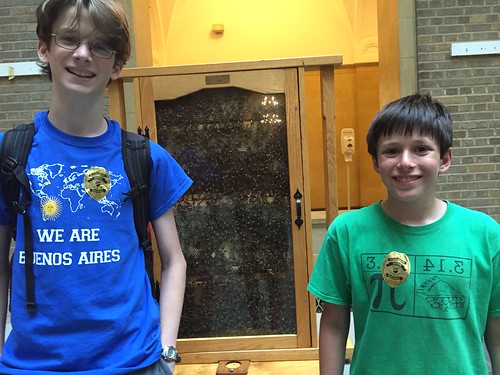Here at USDA, we believe in the power of community to make a difference. So when Alice Deal Middle School in Washington, DC, reached out to the USDA Center for Faith-based and Neighborhood Partnerships to come visit for their annual day of service, we were eager to welcome over 100 seventh graders to our headquarters to talk about the importance of environmental awareness and conservation practices, their theme for this year. With seventy percent of the nation’s land under private ownership, the success of USDA’s partnership with landowners to clean the air we breathe, conserve and clean the water we drink, prevent soil erosion, and create and protect wildlife habitat will depend on developing a strong next generation of conservation leaders like the Alice Deal students. So too, will our ability to manage the public lands and waters, including our national forests and grasslands that we hold in trust for the American people.
After a day with these bright young students, we’ve learned that we’re in pretty good hands.
In unison with environmental demonstrations from USDA’s ARS Bee Research Lab, APHIS Wildlife Services, Norman A. Berg National Plant Materials Center, Forest Service Office of Communication and Conservation Education, as well as the USDA Visitors Center, the students received a gardening lesson and volunteered in the People’s Garden, where they prepared the soil and planted our Three Sisters Garden, weeded our pollinator gardens, and tended to our herb gardens. The day concluded with a live cooking class from Dr. Sonny Ramaswamy, Director of NIFA, on how to prepare guacamole with mealworms. Many of the students were eager to try samples!
We asked 3 middle schoolers to tell us in their own words what they learned from their time here at USDA, and why it’s important to care about the environment. Here’s what they had to say, edited for length:

Name: Josh Landweber
Age: 13 years
7th Grade, Alice Deal Middle School
What was your favorite thing you learned today?
I already knew a lot of the things that were in the exhibits today. We learned a lot of things about ecology in school this year, so I already knew about the water distribution, pollinators, and invasive species. One thing that I felt that I learned a lot about, though, was the bees. Bees have a much more complex structure than I thought. I learned that when the bees feel that their queen has grown incompetent, they kick her out and start raising a new one. Also, beekeepers use a type of smoke to calm down bees before they open the hive.
Why is it important to care about the environment?
If we don’t care about the environment, then there will be no environment left to care for. I might not be able to change things on my own, but I can contribute in order for it to happen. There are a lot of wonderful things out there that we might not know about, and I think I have a duty to make sure that it’s still there for future generations… My actions have far greater effects than I can comprehend… If I don’t take the initiative to try, then who will take my place to stop it? If people don’t care about climate change, then we will lose the environment that has been gifted to the human race forever.
Name: Jonah Docter-Loeb
Age: 13 years
7th Grade, Alice Deal Middle School
What was your favorite thing you learned today?
I learned about the water cycle, bees, and so much more. My favorite thing I learned so far is about the bees. I learned how the queen bee is no different than the other bees, but the only difference is their diet. I also learned that the bees can create a new queen bee if their queen bee dies by feeding a regular bee a certain diet. I learned a lot today.
Why is it important to care about the environment?
It is extremely important to care about the environment for so many reasons that it is impossible to list them all. We rely on the environment and without it we would not be alive. Everything in our society depends on the environment… What people need to realize is the environment is interconnected. Each thing that we do that harms the environment creates a ripple effect.
Name: Olivia Pickens
Age: 13 years
7th Grade, Alice Deal Middle School
Why is it important that you’re learning about community service and the environment?
For more on Deal Gives Back day at USDA, check out our Week In Review!
